|
While Christmas is still some time away, the circumstances surrounding the birth of our Lord give reason for us to pause and reflect throughout the year on the great mystery of the Incarnation—the entering of God the eternal Son into time and the human experience. At the Christmas vigil, the Gospel proclamation involves tracing the ancestral lineage of Jesus as “the son of David, the son of Abraham” and the prophetic culmination of divine promises. Those specifications, similar to the grand announcement of The Nativity of the Lord from the Roman Martyrology, draw upon Sacred Scripture to formally declare the birth of Christ and squarely place His entry into time. The USCCB notes: “It begins with creation and relates the birth of the Lord to the major events and personages of sacred and secular history. The particular events contained in the announcement help pastorally to situate the birth of Jesus in the context of salvation history.”
Reflecting on the genealogy of Jesus helps us to remember that he is part of a human family and was raised with particular role models and inherited traditions. It also reminds us that many people helped prepare the way for the coming of the Savior, playing greater or lesser roles for the glory of the Father’s plan. Two people who are part of Jesus’ genealogy, but passed over in Scripture are the parents of the Blessed Mother, Sts. Joachim and Ann. Factually, nothing about the parents of Mary arises from credible historic sources apart from their existence — not even their names of Joachim and Ann are verified! Although they are passed over in Scripture, Mary’s parents are critical as they represent generations who actively participated in the obligations of family and faith life while anticipating the coming of the Messiah. These saints maintained the spiritual and familial environment that nourished and inspired the Blessed Mother to always trust in God and to famously declare, “May it be done to me according to your word.” We find evidence of Mary’s strength of character and trust in the Lord in Scripture, especially Luke chapter 1 verses 28-55 and John chapter 2: Mary is steadfast in making decisions, active in prayer, obedient to the laws of her faith, calm through moments of crisis, and devoted to her relatives. It is not hard to see how such models of parenthood would likely have inspired Mary’s own upbringing of Jesus. We can wonder how much of Mary’s unyielding belief through Jesus’ ministry, Passion, and Resurrection — especially after seeing her son publically brutalized and murdered — was instilled in her by the fortitude and strength she saw modeled by her own parents during her childhood. What can we learn from the parents of the Blessed Mother? We may not all be grandparents, but we can still influence our families through our receptiveness to the perspectives, experiences, and lessons of those preceding us. Truly these are treasures of wisdom not to be taken lightly or ignored. Pope Francis has sought to convey this important observation. During his first World Youth Day as Pope, observing that Brazilians were celebrating Grandparents Day on the feast of Sts. Joachim and Ann, he reflected: "How precious is the family as the privileged place for transmitting the faith! … How important it is to have intergenerational exchanges and dialogue, especially within the context of the family … Children and the elderly build the future of peoples: children because they lead history forward, the elderly because they transmit the experience and wisdom of their lives." The family is often the first community of love, knowledge, and faith that we experience (CCC 2205). It is a great gift to preserve and strengthen that takes our time, talent, and commitment to keep strong. Yet, just as each of our family members are imperfect, so too is our own love despite our best intentions. At times we may lose patience amidst the demands of life. Or, more tragically, we may find ourselves amongst family members who do not know how to love, perhaps products of their own troubled upbringings. When we face difficulties within our families, or see hurt in other intergenerational families, let us remember that regardless of our human relations, we have been born into the spiritual family of the Church. How wonderful it is that despite our earthly circumstances each of us has been entrusted to call God our Father, Mary our Mother, Joachim and Ann our grandparents and Jesus our Brother and Savior. Sts. Joachim and Ann, pray for us! Questions for Reflection: Who are the people in my family who have taught me the beauty of the faith? Which members of my family need me to show them the love of Christ? **This post was originally published on 7/25/2018**
0 Comments
What does it mean to be a spiritual father? For me, the answer is found in the experience of fathers that I have known or know. Some are biological fathers, others are father-figures, such as older relatives and friends, priests, and religious brothers. Each in his own way showed me how to love in a fatherly way. Spiritual fatherhood is loving universally, not particularly. The love of Christ that urges us on is one that loves all, no matter what. That is not easy to do, and I fail more often at it than I succeed. The only way that spiritual fatherhood is possible is through cooperation with the grace of Christ. A spiritual father is one who is aware of the working of grace in his life and assists others in recognizing the movement of grace in their own. Good spiritual fatherhood does not just happen. Yes, for me, after ordination to the priesthood, people started to call me “Father.” It is true that one is configured to Christ in a unique way through the Sacrament of Holy Orders. Cooperation with the grace of the Sacrament is over a lifetime, though. One grows into spiritual fatherhood, even as a priest. In the first few years of priesthood, I tried to be of service to others by being present to them in their sorrow and their joy. The most profound moments were in listening and accompanying others. I learned not to say much, but simply to be with them, to walk with them as they deepened their life in Christ. Today, my approach to spiritual fatherhood is similar, but with the experience of walking with others sometimes for many years. I have found that they choose to be in such a relationship with me, not simply as a priest, but also as one who is a flawed follower of Christ. A good spiritual father does not claim perfection, but instead is very aware of his faults and failings, as well as the grace of Christ that is working in and through him. Pope Francis offers this consideration in Christus Vivit: “An especially important quality in mentors is the acknowledgement of their own humanity – the fact that they are human beings who make mistakes: not perfect people but forgiven sinners” (246). Good spiritual fathers are keenly aware that they are “forgiven sinners.” When that is forgotten by a spiritual father, then the focus becomes on self, not on Christ. He is the one who forgives sin and gives the grace to love unconditionally and universally for he, and he alone, is God, the Infinite Love. Click here to read more reflections on fatherhood during the Year of St. Joseph.
“He placed himself, in the words of Saint John Chrysostom, “at the service of the entire plan of salvation”. With praise as high as this, Pope Francis described Saint Joseph and his unique place between the Mother of God and the Son.
If Saint Joseph occupies a pivotal role in the divine plan, then his role in my family is just as special. Both of my godsons have the middle name of Joseph - as do I, and my father, his brother, and their father before them. In our family, Joseph is first and foremost a protector. In the Apostolic Letter declaring the Year of Saint Joseph, the Holy Father describes St. Joseph in this way: “Joseph was the earthly shadow of the heavenly Father: he watched over him and protected him, never leaving him to go his own way.” A fundamental element of being a godfather, born from the promises made at Baptism, is the obligation to watch over my godchildren. The daily exercise of this responsibility occurs through prayer. Since the start of the pandemic eighteen months ago, it’s been next to impossible to see my godchildren in person or to be a physical presence in their lives. Consequently, my responsibility to keep them in daily prayer has become doubly important. Morning prayer for my three godchildren is a cornerstone of my daily routine. That prayer has been a constant for me, even when other elements of my routine undergo the dry spells that are part and parcel of the spiritual life. This steadfast but gentle responsibility - prayer for my godchildren - has been a source of sanctification for me. In this, I am privileged to follow in the footsteps of Saint Joseph, who had the unique grace to help raise the Son of God and to be shaped and formed by this responsibility. Beyond protection, Saint Joseph is a model for godfathers by dint of his vigilance. While not strictly a virtue, this watchfulness is closely related to the virtues of prudence, fortitude, and temperance. The Gospel of Luke puts it thus: “Be dressed for action and have your lamps lit” (Lk 12:35). Matthew relates the command of God in even more explicit terms: “Get up, take the child and his mother” (Mt 2:13). While taking nothing away from the Blessed Mother’s incomparable “Fiat”, Joseph exemplifies the ability of responsiveness to God’s call in the face of uncertainty. For me as a godfather, this means living in such a way that I can be responsive to my own godchildren. That might mean being prepared to travel long distances in order to make a sacramental celebration or a birthday. As my godchildren mature and explore their faith, it may also mean being an additional source of counsel (or a source of comfort to stressed-out parents!). Whatever the call may be, the response is the same: be prepared to answer without hesitation, as Saint Joseph did. I would be remiss by not mentioning that Joseph’s care for the Blessed Mother is an example of paramount importance for any godfather seeking to advance his own spiritual life and that of his godchildren! One final element of contemplation for me as a godfather is the title of Saint Joseph the Worker, particularly as it relates to the life of Christ. Through his steady and diligent work, Saint Joseph was a model and example for Our Lord, who himself spent the first thirty years of his life laboring as a carpenter and preparing for his ministry. In the words of Pope Leo XIII, writing in the encyclical Rerum Novarum: “This is enforced by what we see in Christ Himself, who, ‘whereas He was rich, for our sakes became poor’; (18) and who, being the Son of God, and God Himself, chose to seem and to be considered the son of a carpenter - nay, did not disdain to spend a great part of His life as a carpenter Himself. ‘Is not this the carpenter, the son of Mary?’(19)” To this, let me add the words of the Holy Father in his apostolic letter, Patris Corde: “Joseph is certainly not passively resigned, but courageously and firmly proactive. In our own lives, acceptance and welcome can be an expression of the Holy Spirit’s gift of fortitude.” Saint Joseph is an exemplar not only of the ability to respond immediately to God’s call when it comes, but also of the fortitude and diligence to work patiently and well until that call comes. Through his example, we godfathers are reminded to “trust in the slow work of God”, confident that in prayer, labor, and - above all - openness to God’s voice, we can strive to be as Saint Joseph was: “at the service of the entire plan of salvation.” 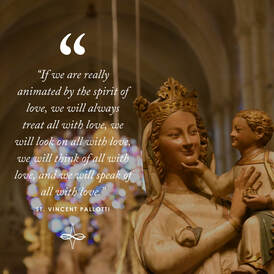 What motivates us to do what we do? If it is love, then we are called to “will the good of another” (St. Thomas Aquinas quoted in the Catechism of the Catholic Church, 1766). The object of our love is not ourselves or our self-interest. It is God and neighbor. St. Vincent Pallotti universalizes love in this way: “If we are really animated by the spirit of love, we will always treat all with love, we will look on all with love, we will think of all with love, and we will speak of all with love” (OOCC III, 338). This type of love requires sacrifice and generosity. Of course, the greatest act of love was the sacrifice of Christ on the Cross. We see generosity and sacrifice in the Blessed Virgin Mary saying “yes” to the Angel Gabriel and St. Joseph setting aside what he wanted to do and always doing the will of God. Sacrificing ourselves for the other, thinking not of self, but the other, is not a typical way of behaving. We seem to be able to do it on a small scale with those closest to us, which is the place to start. Bit by bit, through self-sacrifice, a generosity of spirit grows, love grows. Does this happen on its own? No, the Holy Spirit is moving in and through each of us. The grace of God gives us the ability to sacrifice and be generous, moving us toward universal love. May the charity of Christ urge us on!
7/13/2021 Creating Memories: A Grandfather Reflects on His Role During the Year of St. JosephRead NowWe come in all colors, shapes, sizes. We come with many different names: Papa, Gramps, Granddaddy, Baba, Nonno or maybe even Skipper. The one thing we all share is our unconditional love for our grandchildren. One of my earliest memories of my grandfather Tony (Gramps) was sitting on his lap as he prayed the rosary. As l tried to pull it from his hands, he clutched his beads even tighter. I guess that was my first memory of prayer. When my wife and I had our first child, Gramps told me the 3 greatest things a grandfather can give his grandchildren are love, spoiling them rotten, and memories. I cherish the memories of Gramps to this day: sleeping over at my grandparents’ house, having my picture taken with him at my First Holy Communion, cutting his grass and him giving me a quarter, him asking me to sit next to him at his and grandma’s 40th anniversary dinner, and even taking my then-fiancée when I went to shovel his snow. These are some of the memories he created for me. My dad and father-in-law enhanced the grandfather experience for me as I watched them with our children and their cousins. Birthday parties, school plays, receiving the sacraments or graduations, grandpas were always there. At his grandkids’ Confirmations, my father-in-law would say “Another soldier for Christ”–adding more memories to my collection. l wonder what memories Jesus had of His grandfathers Joachim (the Patron Saint of Grandfathers) and Jacob, St. Joseph’s father. Did He pull on their prayer beads, sleep over at their houses, sit next to them at special occasions? As it becomes my turn to make memories, I pray to St. Joseph that my 4 precious grandchildren will have memories: a picture of us at their First Holy Communion, attending Mass together, me walking them to school or picking them up after school (well maybe after the pandemic), me telling them a corny Papa joke, them giving me a running hug, me spoiling them rotten or maybe even them tugging on my rosary. The aforementioned men have set the bar very high; it is my goal to follow in their footsteps. I remain extremely grateful every day that l have been entrusted to be the Papa of Mabel, Anna, Teddy and Lucy. In the year that Pope Francis has declared the Year of St. Joseph, my best hope would be that St. Joseph gives me the strength to teach them the ways of the Gospel and lead them down the path towards Christ. To me St. Joseph was like an unsung hero. His devotion must have been unwavering. Asked to be the earthly father to Jesus and husband of Mary, WOW!! what a responsibility. Teaching Jesus his trade as a carpenter, teaching Him to pray, preparing Him for manhood, things that many may overlook. St. Joseph simply did the things asked of him by God. God’s love shows through in picking Joseph for this oh so important role in Jesus’ life and the life of the Church. The more I read about St Joseph, the second J of the JMJ (Jesus, Mary and Joseph) I wrote at the top of my school papers long ago, the more awesome I think he is. He did so much without questioning his role. Thank you, St Joseph, for being an inspiration and guiding light as I navigate the waters of being a grandfather. St Joseph, pray for us (especially us grandfathers). To learn more about the Year of St. Joseph and our Fatherhood Series, please click here.
Being a dad is heroic stuff. It demands strength, hard work, a quick wit, a compassionate heart, and an unwavering commitment to the health and well-being of this cute little stranger that has captured your heart. Being a dad is usually intentional. Being an adoptive dad is intentionality on steroids. If all men look to St. Joseph as a guide, companion, and mentor, we will have a more just, prosperous, and peaceful world. While I am writing this reflection for all dads, I want to address young dads or men who are thinking about being dads. My hope is that St. Joseph will awaken in you a clear-eyed grasp of the “fiat” or “yes” of fatherhood. Let me share where I am coming from. I am an adoptive dad with three sons; the oldest is married with three kids of his own, the middle son is headed to college, and the youngest will be a high school junior in the fall. A life-long Catholic, my professional life is in the Church: campus ministry, priestly formation, and mission. Barb and I, married 23 years, wrote a book a few years ago – Rise, Take the Child – Reflections on the Vocation of Adoption. Joseph was an “in the background” saint to me until I became an adoptive dad. In my office, I have an icon of the Holy Family. Our oldest was baptized on the Feast of the Holy Family. In that icon, Joseph is holding Mary (on his right) and Jesus (on his left). He is holding Mary, who is holding Jesus, and he completes the “embrace” of Jesus. Who is this “third person” in the Holy Family? I wanted to encounter Joseph the man. I examined my assumptions. I thought of Joseph as an old man even though biblical evidence suggests he was a strong man, capable of protecting his family, leading them into exile in Egypt and back home, and establishing himself as a successful carpenter. There is nothing “romantic” about Joseph if Shakespeare’s Romeo is our model of a man in love. I find Joseph, in Franco Zeffirelli’s film Jesus of Nazareth, is authentically conflicted; balancing the longing for the completion of marriage, his desire for Mary, the promise of family, the hurt and anger he feels when he learns Mary is pregnant, and his deep desire to do good and avoid evil. Finally, contrary to Joseph’s Song, which I like in many ways, Joseph was not a “simple” carpenter. In the time of Jesus, and even in our time, a carpenter is much more than a laborer. Carpenters were craftsmen – highly skilled and “essential” for society. Some, perhaps even Joseph, were artists. When we pray with Saint Joseph, we need to see him first as a man with his own story, network of relationships, aspirations, work, skill, and deep, abiding faith. This is Joseph, Mary’s tender and loving betrothed, a fierce and decisive protector, a skilled and dedicated provider, and a humble and faithful father who raises Jesus, with Mary, into manhood in first century Galilee. We know the most about Joseph from the Gospel of St. Matthew, which records his four dreams. In his first dream, Joseph “wrestles” with what the law of his faith teaches and what his heart says. Fatherhood is born out of love of a woman. Heterosexual men “long for” the completion a woman provides. This sexual longing (eros) finds its perfection in self-sacrificing love (agape). Joseph does not ignore Mary’s pregnancy – he embraces it as an act of faith and love. He sets aside his fears, welcomes her into his home as his wife, and witnesses God’s saving act unfolding in and through her. His second dream compels Joseph to protect the Mary and the infant Jesus from Herod. Mary, in Luke’s Gospel, “makes haste” to visit her cousin, Elizabeth. Joseph, in St. Matthew’s Gospel, “makes haste” at night into an unknown exile to Egypt, away from the threat of Herod. I am sure there were other dangers on the way to Egypt and challenges in finding work and establishing a home there. There is far less drama in the third dream. Joseph was able to hire himself out as a skilled craftsman and establish a home in Egypt. And yet, he is called by God to help write the great “theo-drama” of salvation so that Jesus, his adoptive son, can fulfill his destiny as God’s “only begotten Son” who is “called out of Egypt.” In some ways, this is Joseph’s “fiat,” his “yes” to God. Through his actions, Joseph accepts the responsibility of raising Jesus as a Jewish man among his people. The fourth dream, on the road home, points to Joseph as provider – choosing a place where Mary and Jesus would be safe, where Jesus could grow “in wisdom and age,” and he could provide for them through the work of his hands. St. Luke’s Gospel points to the peace and tranquility of this domestic time (sometimes referred to as the “hidden life”) for Joseph when he tells the story of Mary and Joseph finding Jesus in the Temple. Imagine the frantic search for Jesus followed by Joseph seeing and hearing his son teaching the elders of Israel in the Temple, the most sacred place on earth. Imagine the rush of emotions – the relief, the wonder, the astonishment. As I prayed with this passage, I was reminded of my experience of my own son playing basketball. He was about ten or eleven years old, he was fouled, and he cautiously approached the free-throw line. He took command of the ball, set his body, and did a perfect shot. Nothing but net. It took my breath away. Others too. We just did not expect “perfection” from someone so young. Was that what Joseph felt when he heard Jesus teaching the elders of Israel in the Temple? In many ways, every father is called to be an “adoptive” father in the sense that they, too, must be intentional, like Joseph, in how they love their children. First, love your wife and partner with her to be a family. Protect her and your children from all that is evil with your strength, perseverance, and decisiveness. Provide for your family through your labor, your craftsmanship, your artistry. And raise your children to adulthood through the witness of your life, integrity, and faith. Pope Francis declared 2021 the Year of St. Joseph, and he wrote a wonderful apostolic letter, Patris Corde (With a Father’s Heart), that provides further insights into this ordinary hero, this extraordinary “every man,” who raised to manhood the Messiah, the Son of the Living God. Click here to read more about St. Joseph in this post written by Barbara and Don McCrabb.
It is rare to find a moment of silence in a household with a two-year-old. Last week, unusually, provided many quiet moments as my normally energetic daughter had a high fever and spent the day on the couch or sleeping only while being held. My wife and I took turns silently holding her to help her get much needed rest. Sitting in silence—without a phone or other distraction--was agitating at first. As the time went on, the simple time spent in silence holding a sleeping child became nourishing and awakened in me a hunger for silence that I often spend time avoiding. This past Lent, I co-led an online small group for newly married men in DC. As we reflected on how the life of St. Joseph relates to us as men, we returned almost weekly to the challenge of finding silence amid phones and families. St. Joseph was not a character that most of us had taken seriously before being married or becoming a father. Yet in marriage and fatherhood, Joseph is the silent role model we need. Someone who understands us and who inspires us. St. Joseph was not a loud or flashy saint. In the children’s books of saints we have for our daughter, the life of silent St. Joseph is hardly mentioned. How can he compete with traveling missionaries, miracle workers, religious founders, and the stories of martyrs losing their heads, eyes, and more? Though his life was not extroverted or bloody, it was no less meaningful. The life of Joseph was a life of daily martyrdoms and silent missions. Without having to leave his home or his workshop, he set out each day as a missionary to offer his life for Jesus and Mary. This is reassuring to me as a husband and father of a toddler, who has been stuck at home during the last 12 months during the COVID pandemic. It is tempting to think that the only way to be holy is to be on the move or to be noticed, like the many Catholic social media influencers or popular Catholic priests or bishops. St. Joseph reminds us of a quieter, ordinary path to holiness that will earn us no new likes or followers. He shows us a hidden, silent example that we need in the noise of daily life. Joseph’s silence teaches us to rediscover the silent mission work found in our own kitchens and living rooms. The artist and Oblate Brother Mickey McGrath has a beautiful image of “St. Thérèse Doing the Dishes.” In the painting, Thérèse is at the kitchen sink elevating a plate as the priest elevates the Eucharist at the altar. This image makes plain our mission as lay men and women to unite our daily work and sacrifices to the great sacrifice of Jesus on the cross which we commemorate at each Eucharistic celebration. Perhaps this image of St. Thérèse doing dishes stands out today because our dishwasher broke this week and my mission field has been researching dishwasher pumps and motor assemblies and spending extra time in soapy water. The image reminds me that God has called me to this mission, regardless of whether it is my preference or how qualified I feel for the task. Joseph must have felt the same way in the ordinary tasks of his workshop and home. St. Joseph is a role model for how we are called to integrate our lives, finding God in every moment of our day—whether doing dishes, praying the Rosary, updating spreadsheets, or building a table. In the life of Joseph, daily work “is a kind of prayer, a way of finding God, a means of salvation…Joseph gave to his carts and yokes the same care he would have given to a tabernacle, since he understood perfectly that a word done in love goes straight to God” (Michel Gasnier, Joseph the Silent, 29). Pope Francis reminds us that, “working persons, whatever their job may be, are cooperating with God himself, and in some way become creators of the world around us” (Patris Corde, 6). St. Joseph is well known for not having a single word recorded in Scripture, but we cannot confuse his silence with a lack of mission. Joseph was a silent missionary who invites us in this Year of St. Joseph to join him in the quiet work. The silent mission of holding a sick child who has fallen asleep, of holding our tongue from an uncharitable word with a family member or colleague, of doing the dishes, or of going about our work with love. Silently. Without recognition. Like St. Joseph. As the mother of a young toddler, I’ve found that life is moving pretty quickly. One moment I’m running after him so he doesn’t grab the dog’s water bowl, and the next, I’m reading his little children’s Bible for the third time in 5 minutes. I’m finding that my toddler is learning so much from his environment. Every day, he can say new words or hum or sing or dance. When I hear him say, “Mama and Vinny,” I just stop and think about Mary.
I love to imagine her as Jesus’ mother: patient and loving, giving hugs, teaching him and walking among flowers. I picture the two of them laughing and playing in the sunshine filled with joy. But I also imagine her with Jesus throughout his life. I start by thinking of Jesus as a toddler--maybe when they were still in Egypt. He likely picked up sand and tried to eat it like my little one would or looked at a camel or water and began to say his first words. Then, I can imagine Mary and Joseph both searching for Jesus while he was not where they thought he should be, but instead in the Temple with teachers showing how much he knew about Scripture. She would be proud of him and his knowledge, maybe with a pang of understanding of his purpose on earth. Then I imagine later on in his first miracle at the wedding at Cana, when she really knew it was time for Jesus to begin his ministry. She supported her son, but also knew it was time to begin God’s work. Meditating on different Scripture passages and moments in the life of Christ can deepen our relationship not only with him, but with the many powerful witnesses to the faith like Our Blessed Mother. Reflecting on moments with my toddler and my own motherhood has strengthened my relationship with Mary over this past year. In this month of May, let us turn to Christ’s Mother and celebrate her motherhood to all of us. Mense Maio, an encyclical by Pope Paul VI which came out on April 29th, 1965 discusses prayer during May for the preservation of peace and the powerful intercession of our Blessed Mother in a variety of ways. As I was reading, I liked how Pope Paul VI mentioned different areas that need our prayers. In the twelfth section of the document called “Plea for Mary’s Help,” he writes, “she graciously lend(s) an ear to the devout pleas of those all over the world who beg her for peace.” As we begin the Marian month of May, let us think about the people in our lives, maybe those marginalized or neglected who are in desperate need for our prayers and petitions. Let us turn to Our Blessed Mother and beg her for peace in our lives and throughout the world. To read more blog posts about the Blessed Virgin Mary, please click here. As we continue through this “Year of St. Joseph” as proclaimed by Pope Francis in his Apostolic Letter Patris Corde, one cannot help but reflect on St. Joseph: adoptive father of Jesus, spouse to the Blessed Virgin Mary, and Patron of the Universal Church. These lofty and impressive titles have been given to a man who in many respects is seen as humble, consistently in the background, and having no words come from his mouth in Scripture. His example of what it means to be a man and a father is one men can strive for.
As a father of a precocious one-year-old, I cannot help but look for examples of how to be a father. Of course, we often look to our own fathers, grandfathers, friends, and perhaps even godfathers and spiritual fathers through the priesthood. There are many qualities that we can emulate from these father figures in our lives, indeed very practical ones. How to change diapers without a mess; how to look good while carrying an undersized backpack filled with wipes, pacifiers, and a change of clothes; or at what posture to best steer that not-tall-enough stroller? What prayers should we be introducing to our young family? How can we strive to provide for our child both practically and spiritually? However, I would suggest another figure to look to: St. Joseph. When my son was baptized, a friend of ours – who happens to be named Joseph – gifted to him (and to us) a statue of St. Joseph. At the time, I considered it more of a funny coincidence, and a nice gesture. As I continued to reflect on it, I really began to see it as providential. Admittedly, as a new father, I was scared and anxious (I still am). St. Joseph undoubtedly faced many of the same anxieties. However, throughout Scripture he is portrayed as a man who sorts out problems and comes up with solutions in practical and brave ways. It is this particular quality that I think we, as fathers, should take as a noble example. There will be times throughout our fatherhoods when we will come to face challenges, confusion, and doubt. St. Joseph protected the Holy Family and trusted in the word of God when it was easy not to trust. As fathers we are called to protect our own families, not necessarily always from harm or danger, and also to provide an example of kindness, love, and humility that so often is characterized as weak. Instead, I invite you to seek St. Joseph’s noble example and see these qualities as a strength. We also need to trust in God. Pope Francis says in Patris Corde, “The greatness of Saint Joseph is that he was the spouse of Mary and the father of Jesus. In this way, he placed himself, in the words of Saint John Chrysostom, 'at the service of the entire plan of salvation.'” Let us as fathers follow in St. Joseph’s noble example to place ourselves at the service of God’s plan for us. Then we will truly be able to serve our families without fear or anxiety. For more on St. Joseph, read our blog post: “Ite Ad Joseph: 10 Quotes to Celebrate the Year of St. Joseph.” Next week is Holy Week. Before we arrive there and enter the most solemn of days of the Church year, the Easter Triduum, we come to another Solemnity during the Lenten season. Last week, it was the Solemnity of St. Joseph, spouse of the Blessed Virgin Mary and patron of the Universal Church. Tomorrow, it is the Solemnity of the Annunciation of the Lord. Both offer us examples of how to respond to God’s action in our lives. The Blessed Virgin Mary and St. Joseph responded freely and fully to God’s invitation announced by the angel to move in directions that they did not expect. While we may not have an angel announcing God’s will for us, in what ways do we discern the direction that we are called to take? Recently, I attended the religious profession of a Benedictine monk who is a former student of mine. Some of those who attended the Mass and profession ceremony in support of him were also former students who are now either diocesan or religious priests or married with children. (Some are also former staff members and collaborators of the Center.) Each in their own way has followed God’s invitation to them. In and through their chosen vocations, they have found joy in living more deeply their Christian life.. While they have found joy, they also know what it means to take up the cross and follow Jesus Christ as his disciples. None of them made the choices that they did easily, but did so through cooperation with the grace of Christ. We are called to the same. Holy Week offers us an important opportunity to reflect, discern, and act on God’s will in our lives. Join us on social media for our Virtual Holy Week retreat. We offer it as a way of doing this type of discernment in the context of this most solemn time. Please know that our prayers are with you, especially during the Easter Triduum and season. May the charity of Christ urge us on!
On December 8th, the Solemnity of the Immaculate Conception of the Blessed Virgin Mary and the 150th anniversary of the proclamation of St. Joseph as patron of the universal church, Pope Francis proclaimed the Year of St. Joseph. To celebrate this historic moment in the universal Church, the Catholic Apostolate Center has launched a series exploring the depth and richness of fatherhood. We will feature one post a month from fathers at different stages of fatherhood, godfathers, spiritual fathers, priests, and grandfathers throughout the year. We invite you to join us this year in learning more about masculinity, fatherhood, the dignity of labor, and the importance of faithfulness to the will of God. As we continue in our life of faith, we invite St. Joseph to be a father to each one of us, guiding us ever closer to his adopted son, Jesus. May he teach us how to be faithful disciples constantly adoring the face of Christ. To kick off our fatherhood series, I’d like to share some powerful quotes from Pope Francis’ Apostolic Letter, Patris Corde, that will help us more deeply come to know the quiet carpenter who helped raise the Son of God. 1. “Each of us can discover in Joseph – the man who goes unnoticed, a daily, discreet and hidden presence – an intercessor, a support and a guide in times of trouble. Saint Joseph reminds us that those who appear hidden or in the shadows can play an incomparable role in the history of salvation.” Throughout salvation history, God has repeatedly chosen the least likely of candidates to accomplish his will. Moses was slow of speech. Peter was a fisherman. Paul was a persecutor of the Church. Joseph was a carpenter. What matters not to the Lord is our status in life, our accolades, our prestige, or our mightiness, but simply that we do His will. St. Joseph modeled that in every moment of his life—from accepting Mary into his home, to naming his Son Jesus, from fleeing to Egypt, to returning to Nazareth. St. Joseph, teach us obedience and humility. 2. “The greatness of Saint Joseph is that he was the spouse of Mary and the father of Jesus. In this way, he placed himself, in the words of Saint John Chrysostom, 'at the service of the entire plan of salvation.'[7]” Joseph was a father in every sense of the word. He guided and protected his family, provided for them, and loved them with tender affection. Everything he did was for the well-being of Mary and Jesus. He is a strong servant leader—one that all men can learn from. To be a father is a great blessing and gift. St. Joseph, help us to be servant leaders. 3. "Saint Paul VI pointed out that Joseph concretely expressed his fatherhood 'by making his life a sacrificial service to the mystery of the incarnation and its redemptive purpose. He employed his legal authority over the Holy Family to devote himself completely to them in his life and work. He turned his human vocation to domestic love into a superhuman oblation of himself, his heart and all his abilities, a love placed at the service of the Messiah who was growing to maturity in his home.'[8]" Just as faith without works is dead, so too is love devoid of service. St. Joseph did not love solely with his words, but by his actions—which is likely why Scripture does not recount any of his speech—with St. Joseph, there was no need. His entire life was a song of love for the Holy Family and for God. St. Joseph, teach us to love as you loved. 4. "Joseph saw Jesus grow daily 'in wisdom and in years and in divine and human favour' (Lk 2:52). As the Lord had done with Israel, so Joseph did with Jesus: he taught him to walk, taking him by the hand; he was for him like a father who raises an infant to his cheeks, bending down to him and feeding him (cf. Hos 11:3-4)." So often, we confuse holiness with otherworldliness. Perhaps we imagine celestial music, bright light, and the presence of angels accompanying the saints wherever they went. But to be holy is to be most fully human—at St. Iraneus said, “The glory of God is man most fully alive.” True holiness means living out our vocations fully, and that includes family life. St. Joseph would have fed Christ and eaten with him, he would have helped him get dressed or tied his sandals, he would have played games with him, sang with him, and worked with him. To be holy is not to be out of touch with reality. St. Joseph was not above the normal duties of fatherhood. St. Joseph, teach us to live out our vocations fully by taking Christ by the hand. 5. "Even through Joseph’s fears, God’s will, his history and his plan were at work. Joseph, then, teaches us that faith in God includes believing that he can work even through our fears, our frailties and our weaknesses. He also teaches us that amid the tempests of life, we must never be afraid to let the Lord steer our course. At times, we want to be in complete control, yet God always sees the bigger picture." A life of holiness does not mean one devoid of fear or suffering. This was true even for Joseph and Mary. What makes Joseph such a model for us is not that he was fearless, but that he trusted in God. He did many things that were difficult and probably not what he had intended for his life, but he trusted and obeyed. He hears the will of God and acts. Later on, Christ himself does not promise a life without the cross, but that He will always remain with us as we carry our crosses. It is when we give God our fears, frailties, and weaknesses that He can transfigure us for His glory. St. Joseph, teach us to trust God. 6. "During the hidden years in Nazareth, Jesus learned at the school of Joseph to do the will of the Father. That will was to be his daily food (cf. Jn 4:34)." The home of the Holy Family was a domestic church in which virtue flourished and sanctity was cultivated. As the head of the family, Joseph served as a priestly figure and an earthly shadow of God the Father. Joseph would have been a man of Scripture who obeyed God’s commandments and lived a life of authenticity and virtue. How beautiful it is to think that Jesus “learned at the school of Joseph.” St. Joseph, teach us to do the will of the Father. 7. "Just as God told Joseph: 'Son of David, do not be afraid!' (Mt 1:20), so he seems to tell us: 'Do not be afraid!' We need to set aside all anger and disappointment, and to embrace the way things are, even when they do not turn out as we wish. Not with mere resignation but with hope and courage. In this way, we become open to a deeper meaning. Our lives can be miraculously reborn if we find the courage to live them in accordance with the Gospel. It does not matter if everything seems to have gone wrong or some things can no longer be fixed. God can make flowers spring up from stony ground. Even if our heart condemns us, 'God is greater than our hearts, and he knows everything'(1 Jn 3:20)." The words of God to Joseph echo once more for us today: do not be afraid! Fear, stress, and confusion are all normal to the human condition. God is not asking us to erase these feelings from our lives, but to give them over to Him. He is calling us to abandon ourselves to His loving providence and not become imprisoned by these emotions. St. Joseph may have feared for his family’s safety and well-being, but he was not consumed by fear or paralyzed by doubt. Pope Francis calls him, “creatively courageous.” “In the face of difficulty,” he writes, “we can either give up and walk away, or somehow engage with it.” Joseph engaged. St. Joseph, teach us to abandon ourselves to God. 8. "Work is a means of participating in the work of salvation, an opportunity to hasten the coming of the Kingdom, to develop our talents and abilities, and to put them at the service of society and fraternal communion. It becomes an opportunity for the fulfilment not only of oneself, but also of that primary cell of society which is the family." Work is a part of God’s plan for humanity. What was not part of God’s plan was toil or fruitless labor that does not uphold mankind’s dignity. Prior to the Fall, Adam was called to till and cultivate the land. Christ has redeemed work once again by enabling us to offer all that we do and unite it to His sacrifice on the Cross. Our work can now have immeasurable meaning and be a means of sanctification. Joseph is also known as St. Joseph the Worker. He worked as a carpenter throughout his life and in this way provided for his family. When we work for others, when we work well and faithfully, our work can be a means of building up the Body of Christ and loving or serving one another. St. Joseph, teach us the dignity of human labor. 9. "Fathers are not born, but made. A man does not become a father simply by bringing a child into the world, but by taking up the responsibility to care for that child. Whenever a man accepts responsibility for the life of another, in some way he becomes a father to that person." Fatherhood is so much more than physical procreation. It involves the cultivation of family and of the human person. It means providing for the spiritual or physical well-being of others. For this reason, priests are also called “Father.” They represent our Heavenly Father and make manifest His graces poured out in the sacraments. They accompany us on our spiritual journeys and act as shepherds guiding us towards holiness. Godfathers, too, play an important role in society by serving as models of holiness for their godchildren and praying and interceding on their behalf. St. Joseph, teach men true masculinity and authentic fatherhood. 10. "The Church too needs fathers." Not only do families need fathers and stable father figures, the Church and world do as well. Authentic fatherhood is an essential part of God’s plan for humanity and is a part of God’s very identity. Society cannot exist and thrive without healthy and holy fathers. God chose to enter the world through a family and was obedient to his foster father Joseph while under his care. Scripture tells us that he "was obedient to them (Joseph and Mary).” St. Joseph, help raise up strong and loving fathers and father figures in our Church and society. As we journey together in the Year of St. Joseph, let us pray to this powerful intercessor using the prayer of Pope Francis, Hail, Guardian of the Redeemer, Spouse of the Blessed Virgin Mary. To you God entrusted his only Son; in you Mary placed her trust; with you Christ became man. Blessed Joseph, to us too, show yourself a father and guide us in the path of life. Obtain for us grace, mercy and courage, and defend us from every evil. Amen.
The family is the environment in which we learn to relate to others, where we are cared for and loved. But it can also be a laboratory for sadness, bruising, and wounding. Moments of grace separate one from the other. Mere humans living together in close proximity in the home, sharing the nitty gritty of life, is full of all kinds of challenges! How many times do we have a misunderstanding and have the sense to apologize? Dealing with people is messy business and hurt happens. It is heroic to operate in the grace of the Holy Spirit to ask forgiveness when we hurt one another. The simple ability to look past our own feelings and see how we impact others – that is life-changing behavior. “I’m sorry that what I did was hurtful to you. Please forgive me”—this is humility, and when we operate at this level within our family, we can change the world. As I see it, the two most important virtues of a holy family are patience and forgiveness. Thank goodness perfection is not required, just steadfastness.
The readings from the Mass for the feast of the Holy Family, which we celebrated on the first Sunday after Christmas, are beautiful reminders of how to behave and interact with each other in our families. “God sets a father in honor over his children; a mother’s authority he confirms over her sons. He who honors his father atones for sins; he stores up riches who reveres his mother. He who honors his father is gladdened by children, and when he prays he is heard. He who reveres his father will live a long life; he obeys God who brings comfort to his mother. My son, take care of your father when he is old; grieve him not long as he lives. Even if his mind fail, be considerate with him; revile him not in the fullness of our strength. For kindness to a father will not be forgotten, it will serve as a sin offering-it will take lasting root.” Sirach 3:2-7, 12-14 This passage expounds on the fourth commandment because Jesus wanted us to understand the importance of family as the cornerstone of society. In her acceptance speech for the Nobel Peace Prize in 1979, Saint Mother Teresa said, “My prayer for you is that truth will bring prayer in our homes..[and] we will begin to love. And we will love naturally, we will try to do something. First in our own home, [then the] next door neighbor in the country we live, [then] in the whole world.” In our progressed world, we think of evangelization and mission in terms of global work, but we cannot achieve spreading the faith if we do not practice in our own families. Colossians 3:12-21 gives us further practical instruction on how to relate to one another. “As the chosen of God, then, the holy people whom he loves, you are to be clothed in heartfelt compassion, in generosity and humility, gentleness and patience. Bear with one another; forgive each other. The Lord has forgiven you; now you must do the same. Over all these clothes, put on love, the perfect bond. And may the peace of Christ reign in your hearts, because it is for this that you were called together in one body. Always be thankful. Let the Word of Christ in all its richness, find a home with you. Teach each other, and advise each other, in all wisdom. And whatever you say or do, let it be in the name of the Lord Jesus, in thanksgiving to God the Father through Him. Wives, be subject to your husbands, as you should in the Lord. Husbands, love your wives and do not be sharp with them. Children, be obedient to your parents always, because that is what will please the Lord. Parents, do not irritate your children or they will lose heart.” What makes the family so extraordinary is all the goodness that can come when we learn to love. We die to self in saying we are sorry for our offenses. We grow in virtue when we focus on the needs of others instead of ourselves. A quote often attributed to G.K. Chesterton states, “The most extraordinary thing in the world is an ordinary man and an ordinary woman and their ordinary children.” God has set an incredible task before us – to love the people in our family through our actions and our attitude. This is the heart of radical evangelization. And it will change the world! For more resources on marriage and family, please click here. As we celebrate the Nativity of our Lord Jesus Christ at Christmas, I find myself grateful that the Church has established the liturgical calendar in such a way as to help shake us out of our spiritual complacency. The high-points of the Church year—and the larger Christian experience— are referenced so much in our Faith that we may sometimes find ourselves on spiritual autopilot. Before we know it, we might find that solemnities are immediately upon us (or past us), and we feel that we could have benefited from more spiritual preparation. This year, I was looking for a clear and direct theme I could really focus on as Christmas approached. I came across some writings of Venerable Servant of God Fulton Sheen that called to mind certain details of Scripture that my eyes (and spiritual life) might typically gloss over. Recalling the helpless innocence of the Christ-child ready to be born of Mary, Sheen related Mary and Joseph’s plight in searching for late-night shelter in Bethlehem to the lack of hearts open to God which can offer the King of Kings and Lord of Lords a place to dwell and reign:
[W]hen finally the scrolls of history are completed down to the last word of time, the saddest lines of all will be: ‘There was no room in the inn.’ The inn was the gathering place of public opinion, the focal point of the world’s moods, the rendezvous of the worldly, the rallying place of the popular and the successful. But there’s no room in the place where the world gathers. The stable is the place for outcasts, the ignored, and the forgotten… The lesson is: divinity is always where you least expect to find it. So the Son of God-Made-Man is invited to enter into His own world through a back door.[1] With all the seasonal emphasis on gifts and personal generosity, I am especially touched by that first line and the reality that there was no room made available for the arrival of the long-awaited Son of God. How often do we hear calls to be watchful and ready for the Second Coming of Christ; that is, to be repentant of sin and committed to pursuing holiness? This preparation is what the first part of the Advent season is all about. When we are called before the Final Judgement seat of the Most High, and God Himself shows us what we did or did not do for Him[2] in our earthly encounters with the people in our lives, will we say that it was too difficult or inconvenient to take up what we knew was expected of us? All of the baptized are called to be missionary disciples—people who spread the joy of the Gospel by their very lives. We can bring others into an encounter with the Living God—or at least instill a sense of hope, dignity, and love in those who are in need—in the workplace, at home, in our neighborhoods, in our parishes, and within our families. In doing so, we make room in the inn of our hearts for the Christ-child. Without Christ present in our hearts and at the core of our being, we will find ourselves serving a different master—be it vices, worldly pleasures, fleeting successes or honors, or other vanities. Just as the innkeepers of Bethlehem two-thousand years ago declined to open their doors to the Holy Family, so too do each of us have the choice either to be seduced by the empty promises of the world or to pursue a life of holiness and of speaking the Truth among the doubtful, suspicious, hateful, or unrepentant. This Christmas season, let us allow Christ into our lives in order to bring him to others. Let us preach the Gospel with our lives and seek to always make room for him in the inn of our hearts. Christmas is a time for celebration! We rejoice that the Lord God Himself took on human nature and was born as a helpless Child into the world He created in order to free us from sin and death and invite us to live with Him forever. The occasion of Christmas encourages each of us to be a welcoming soul to the Lord rather than one who closed their doors to the Holy Family that holy night: Joy to the world, the Lord is come! Let earth receive her King! Let every heart prepare Him room. And let it begin with me. Amen. [1] Sheen, Fulton. “Life of Christ” (1954). [2] cf. Matthew 25:40. The beginning of summer is an exciting time. The school year may be done, and more leisurely activities may be planned, but for the ministry of a local church, the work never stops. The sacraments must be administered, the Holy Mass must be celebrated, the sick and dying must be cared for, and those with life’s burdens and clouds of uncertainty must be consoled: the sacred works of ministry never cease. As even our Lord observed, “The harvest is abundant but the laborers are few; so ask the master of the harvest to send out laborers for his harvest.” God calls upon certain men to embrace a unique vocation of humble sanctity, service, and obedience as priests. As such, seeing the result of years—even decades—of discernment and spiritual formation come to fruition is a cause of immense jubilation for a local church. Ordination day, then, gathers the diocese to happily witness the sacred rite through which the bishop consecrates these men into priestly service. And how wonderful such an occasion is— especially for those who have walked with these men—as new spiritual life is breathed into the church.
While recent scandals might cause some to worry or be wary, the celebration of priestly ordination serves as a reminder that God remains with us and never ceases in caring for the needs of his Church. The sinful actions of a few do not negate the sanctity and solemnity of a call to holy priesthood; the standard remains high even though some have acted beneath it. The saying “God is good, all the time; all the time, God is good” serves as a simple but handy reminder of His faithfulness, which is manifested in the ongoing call for certain men to care for the immense needs of His people. As Cardinal Timothy Dolan of New York observed: Is that not good news? Aren’t you tired of hearing about priests who are trouble? Aren’t you fatigued about hearing of priests in scandals? Aren’t you kind of weary [hearing] about priests that have been removed? Don’t you get a little discouraged when you hear about the vocation crisis? Now, all of those are realities; we don’t need to run from them, but I don’t know about you, but I see six new priests who are enthusiastic and eager and raring to go. That gives me a lot of hope and a lot of encouragement. And it’s going to be a high honor for me to ordain them. Discerning how to answer God’s calling to a vocation in your life is an ongoing process, but this does not mean you need to wrestle with it alone. The Church has a wealth of resources to aid in beginning to answer the questions regarding vocational discernment. Spiritual direction is a common method—whether in person or through a treasure trove of books and reflections which have been produced through the centuries and for a Church which has faced a whole spectrum of challenges and threats. God remains with us through it all! Other means of discernment include retreats and talks offered by dioceses and religious communities. And this is also true for those who may be discerning marriage as a vocation. In Holy Scripture, priesthood can be traced back to the Levite tribe of the Israelites, but the family unit is often modeled after the Holy Family, the highest ideal. No matter what your calling in life, God has sanctified it and calls us all to best apply our lives to the service of others through our vocation. Just as the United States has recently commemorated Memorial Day and the countless who have died answering the call to fight for and defend our rights and freedoms, we as a church can come together to appreciate and love our priests, who live to serve the Body of Christ. They have heard and answered the call of the Most High God and trusted in Him to illuminate the path they have been destined to follow in service. They walk with us in faith to celebrate the sacramental life of the Church and comfort those who seek consolation and peace. In supporting our priests and religious—who can be found in parishes, hospitals, cemeteries, battlefields, and schools—we can celebrate with them as their numbers increase during ordinations so as to aid in the beautiful works of holy ministry. For more resources on Vocational Discernment, please click here. . I can recall from a very young age pondering what it means to be Catholic. We were supposed to somehow be different from secular society by the way we lived our lives, but how or why was that any different than simply being a good, kind, and moral human being? Can “normal” domestic life be holy? Why is the domestic church—the Christian family—so vitally important to our faith? Throughout my life, this question has been answered in various ways and degrees. However, nothing has been so powerful as what I have witnessed in the past few months. In the late fall of last year, my mother-in-law underwent unexpected surgery and was unable to attend Mass. During our family’s Thanksgiving visits, I witnessed an incredible moment of our faith: my mother was able to distribute the Sacred Body of our Lord to my mother-in-law. Tears fell from my mother-in-law’s eyes as my husband, father, mother, and I encircled her, reciting prayers together in preparation for the distribution of the Eucharist. I was struck by the immensity of this moment: as I witnessed the woman who gave me life distribute the source of eternal life to the woman who gave my husband life, the depth and vital importance of the domestic church began to come into clearer focus for me. The Christmas season would bring me another unexpected intersection of family and faith and another reminder of the significance of the domestic church. My father was hospitalized between Christmas and New Year’s; I found myself once again in the midst of a family circle of prayer as this time I witnessed my sister ministering the Sacred Body of our Lord to both my father and mother. My husband, nieces, nephew, brother-in-law, and I encircled my father’s hospital bed. Again, I found myself struck by the immensity of the moment unraveling before me; there is something very profound in witnessing the physical, tangible presence of Christ enter into vulnerable family space. I held these moments in my heart and in my mind, reflecting on them as the days rolled by between the holidays and the beginning of Lent. This year, our parish announced that they are encouraging families to consecrate themselves to the Holy Family. Ah, the Holy Family, the perfect model of the domestic church! It is within the context of the family that we learn about our faith and see examples of faith lived out. Christ Himself was born into a family; it was a vital part of his plan of salvation. We are each called to sainthood and each of our paths to sainthood will look a bit different. Lent is a beautiful time to really evaluate how close we are to following that path and what we can do in our lives to stay the course. No matter what path our calling leads us on, all paths lead back to the family—whether that be our own family by blood or our brothers and sisters in the faith. How do we live out each day as a domestic church and bring that holy reverence to our everyday lives? We are called not only to love one another but to LIVE for one another. I witnessed this profoundly over the holidays when I saw different members of my family live for and serve one another. But there are also opportunities being presented throughout our everyday life to grow in holiness and spiritual maturity—especially now during this Lenten season. Lent is not only a time to deny ourselves of those things that keep us from our path to sainthood but also a time to invite the Holy Spirit to open our eyes and hearts to opportunities of everyday holiness and saintly domesticity. Christ wants to be a living presence in our homes and in our families, but we have to open the door for Him and invite Him in. I saw the effects of Christ’s presence in my family in those moments when He was brought physically to my parents and mother-in-law. Christ brings unity, service, strength, love. Just as in our physical lives we can manage the stresses and craziness of ever day life better when we fuel our body with proper nutrition and exercise, so too are we called to fuel our spirits and our family bonds with the Bread of the angels and on every word that comes forth from the mouth of God. What spiritual exercises can we work through together as a family this Lenten season? How can we work to call one another to a life of saintly domesticity? For more resources to accompany you throughout your Lenten journey, please click here. To learn more about Marriage and Family, please click here. |
Details
Archives
July 2024
Categories
All
|
About |
Media |
© COPYRIGHT 2024 | ALL RIGHTS RESERVED

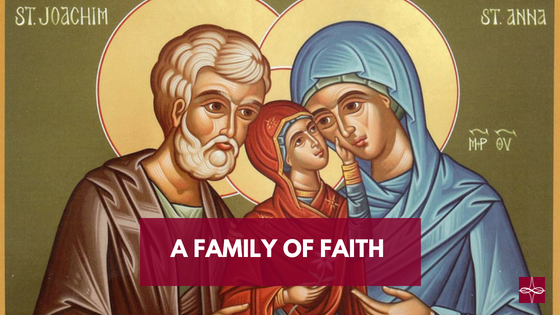

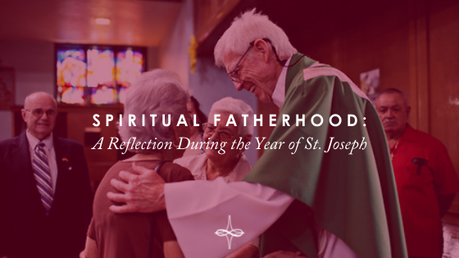
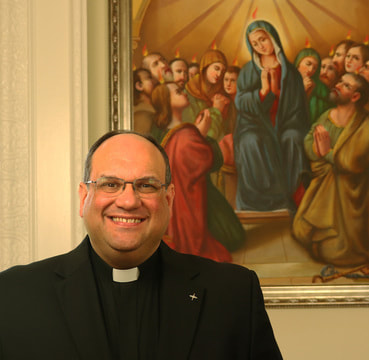


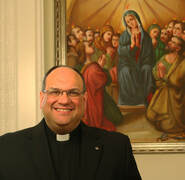

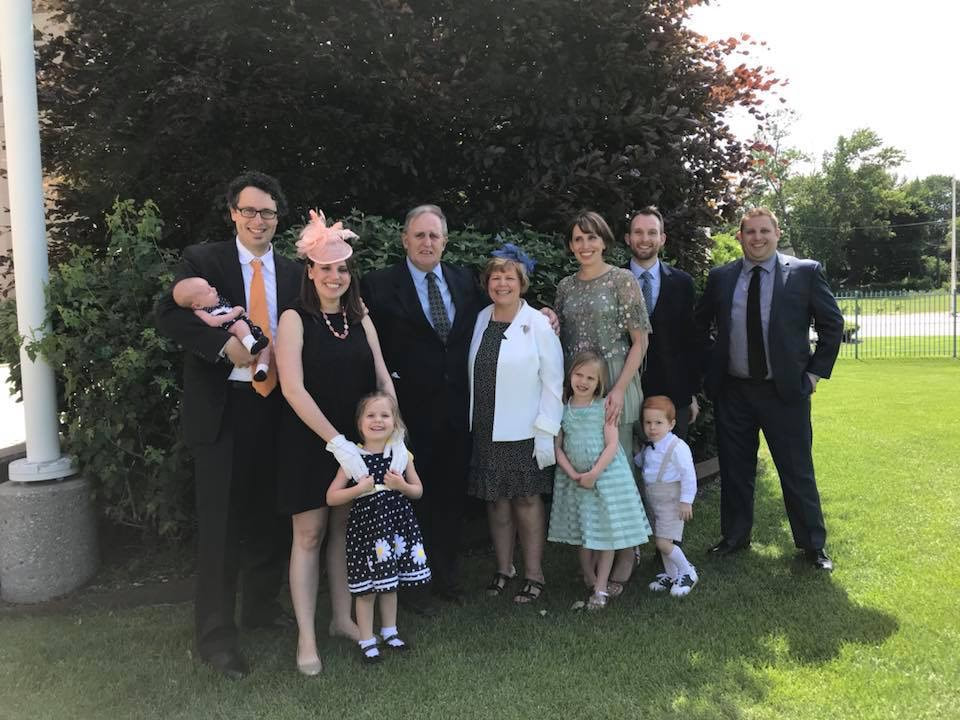


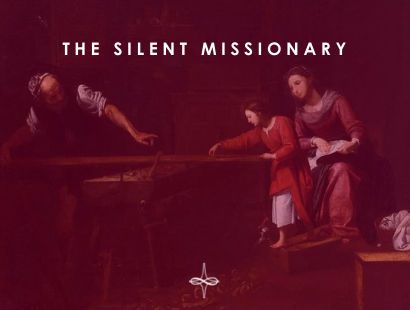

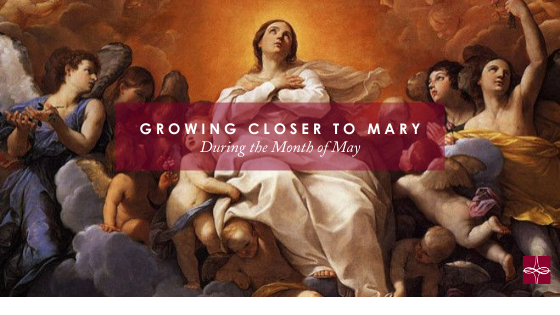

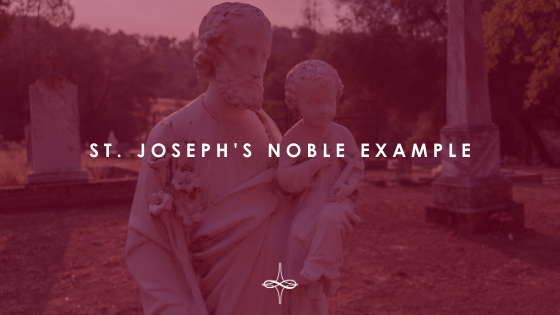


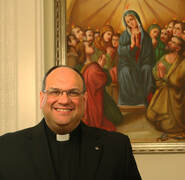
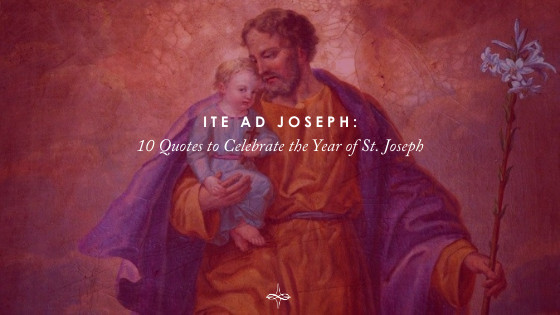



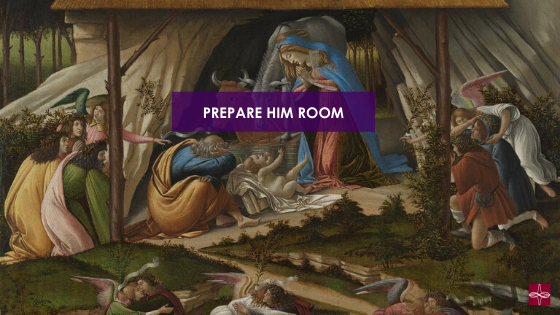

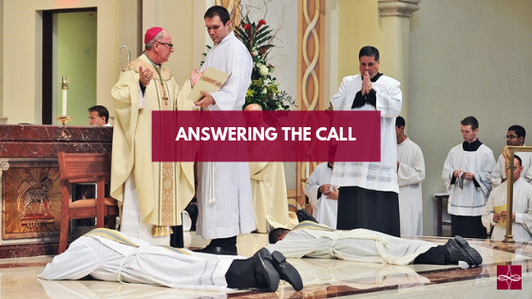



 RSS Feed
RSS Feed